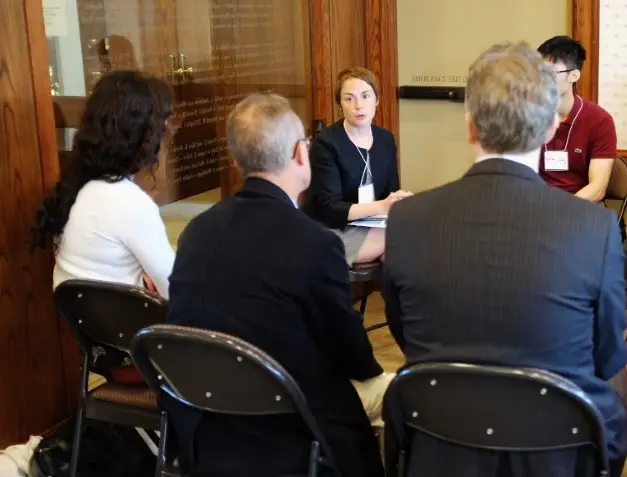Envisioning the Energy Future for Rhode Island: Event Recap
On June 26, Acadia Center hosted UtilityVision: A Discussion about the Clean Energy Future for Rhode Island at The Rhode Island Foundation in Providence. The objective was to provide an in-depth look at what the clean energy future could be for Rhode Island and beyond, as well as engage diverse stakeholders to work through the various challenges to implementation. Acadia Center’s presentation described a practical and positive pathway to achieving Rhode Island’s climate change goals and recommendations for reforming the way the energy system is paid for and planned.

The meeting brought together a diverse group of Rhode Islanders who are thinking about the future of the state’s energy system. Attendees included representatives from clean energy companies, universities, state and federal policy makers, consumer and environmental advocates, state environmental agencies, and the media.
Following the presentations, attendees enthusiastically participated in discussion groups led by Acadia Center staff. The discussion groups each focused on: investments in big infrastructure like pipelines and their impact on Rhode Island’s clean energy future; the changes necessary to fully benefit from new clean energy technology; the reforms needed to align utility incentives with consumer and environmental goals; and the challenges energy efficiency programs face.
These topics sparked lively dialogue and some insights including:
- Rhode Island has nation-leading energy efficiency programs, but there are still hard-to-reach sectors like renters that struggle to benefit from them. If municipalities require landlords to share past energy bills with prospective tenants or create a minimum energy standard for all rental housing, it could ensure that all renters are protected from burdensome energy bills.
- Rhode Islanders need to make sure the right questions are being asked about proposals to publicly finance expanded natural gas pipelines that could lock the state into an outdated energy system for the next half-century. Decision-makers should ask more questions about potential lower risk, lower cost, and cleaner solutions.
- New electric technologies, like electric vehicles (EVs) and battery storage, have the potential to help Rhode Island meet its climate change goals. However, there are barriers to consumer adoption of EVs in the region, including reluctance by auto dealers to market them due to the need for more time spent educating the consumer and lower future revenue potential from vehicle maintenance. Utilities may need different financial incentives in order to be full partners in promoting electric vehicles and help overcome these barriers.

In the coming months Acadia Center will address many of these concerns by participating in the development of the state’s 2016 Energy Efficiency and System Reliability Program Plan, and in the RI Public Utilities Commission’s proceeding on reforming electric distribution rates in light of a changing energy system. We hope to stay connected with those who joined the event to provide updates and coordinated support for progress toward a clean energy future.
Abigail Anthony leads Acadia Center’s Grid Modernization and Utility Reform initiative, focusing on changing regulatory and economic incentives in order to achieve a sustainable and consumer-friendly energy system. A Rhode Island native, Abigail is director of the Providence office and has played a leading role in advancing the state’s energy efficiency procurement policies.



















